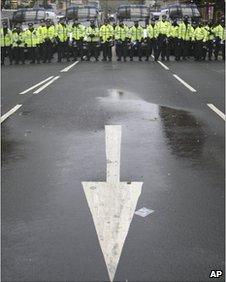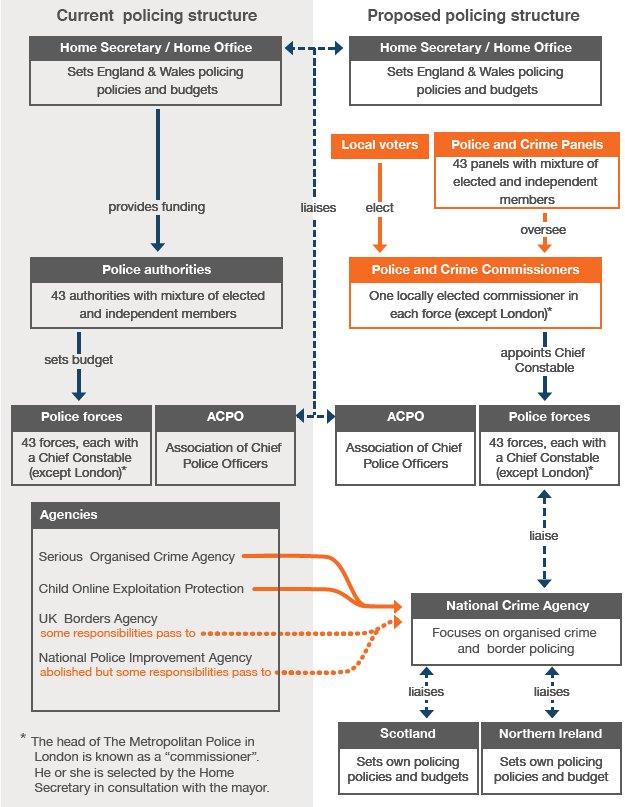New police commissioners 'could cost more than £136m'
- Published

Ministers are looking for a way forward on how police bodies are organised
The cost of introducing police and crime commissioners could reach more than £136m over 10 years, government documents show.
The elected officials overseeing forces in England and Wales outside London would be paid about £122,000 a year.
Police forces are facing cuts of between 14% and 20%.
Rob Garnham, chairman of the Association of Police Authorities and a Conservative councillor, said it was the "wrong policy at the wrong time".
Unveiling the proposals, Home Secretary Theresa May said there would be a bold shift of power in policing.
"These new measures will place the public back at the heart of our drive to cut crime, giving them a say in how their local area is policed by electing a police and crime commissioner and strengthening the powers that police and councils need to tackle crime and disorder at a local level," said Mrs May.
But shadow home secretary Ed Balls said: "This goes against a 150-year tradition of keeping politics out of policing.
"It raises the very real prospect of a politician telling a chief constable how to do their job. Even the government's own consultation confirms the very real fear that plans for elected police chiefs will see money spent on bringing politicians into running the police instead of on the front line."
The first of the proposed commissioners are expected to be in place by May 2012, with the power to hire and fire chief constables.
Ed Balls: "People say it's David Cameron's idea. David should think again"
'Web of red tape'
Ministers say the planned commissioners, similar to the US system, will improve the local accountability of police forces and their chief constables.
But many chief constables are concerned elected officials will interfere in day-to-day policing, making it difficult for them to balance local duties with their national responsibilities.
Mr Garnham said: "At a time of budget cuts and public concern, this Bill is the wrong response to people's priorities. The public understand the need to tackle the deficit. They also want to be kept safe.
"But where's the evidence that the public want more elections, or more politicians? Where's the evidence that bringing in police commissioners will cut crime?"
But Mrs May said: "For too long, the fight against crime has been tangled up in a web of centrally imposed red tape that has driven a wedge between law enforcement agencies and the communities they serve.
"I am determined to rebalance that by giving the public and the police and councils the powers they need to deal with the issues that blight too many of our communities."
Mrs May said the commissioners would not cost more than the police authorities they will be replacing - but official estimates show that the elections to be held every four years from May 2012 would probably cost an additional £50m.
The salaries and benefits for the 41 commissioners are subject to approval by the government's Senior Salaries Review Body. The Metropolitan Police and City of London Police will not be subjected to the reforms.
At the general election, both coalition parties pledged greater local accountability of the police. The proposed commissioners were a specific Conservative idea.
The Police Reform and Social Responsibility Bill, external says chief constables would retain responsibility for "the direction and control of the police force" but would be held to account by the elected commissioners.
The commissioner's basic duties include publishing a police and crime plan, setting local police and crime objectives and the budget. Commissioners will be able to hold office only for two terms.
Policing Minister Nick Herbert: "Nobody knew who their police authorities were"
The home secretary will retain the power to intervene in a local force where a commissioner is "preparing to set a budget that was less than necessary to maintain appropriate policing in the area". She will also have the power to ensure "proper collaboration" on national policing issues.
London's deputy mayor and policing specialist Kit Malthouse welcomed the plans and said: "The current policing world is confused and opaque. This bill will bring clarity, transparency and focus."
The bill was also welcomed by Louise Casey, commissioner for victims and witnesses, who said it would make police forces more accountable and more responsive to local demands.
She said: "Victims are the poor relation in the criminal justice system and this is an important step in the right direction in getting their views heard."
Blair Gibbs of the Policy Exchange think tank said the reforms were overdue and added: "The current model of police authorities was clearly failing and chief constables had become too powerful.
"This distinctive British model will make police chiefs truly accountable for the first time and the public will notice the difference."
The bill also includes new local powers on alcohol licensing and measures to temporarily ban so-called "legal highs" which have not yet been fully assessed by drugs experts. A further reform to crime fighting, to create a new national crime agency including the current Serious Organised Crime Agency, will come in future legislation.

- Published26 July 2010
- Published26 July 2010
- Published27 July 2010
- Published29 June 2010